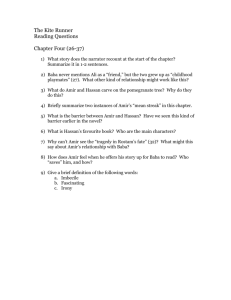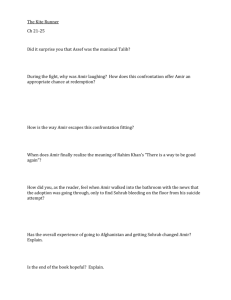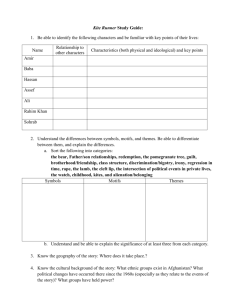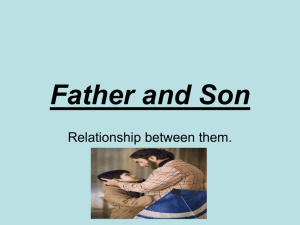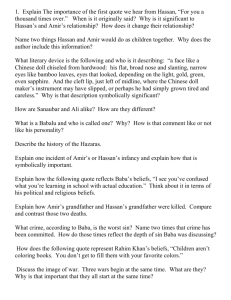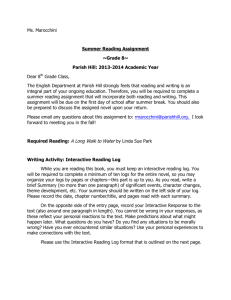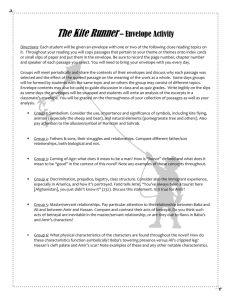The Kite Runner
advertisement
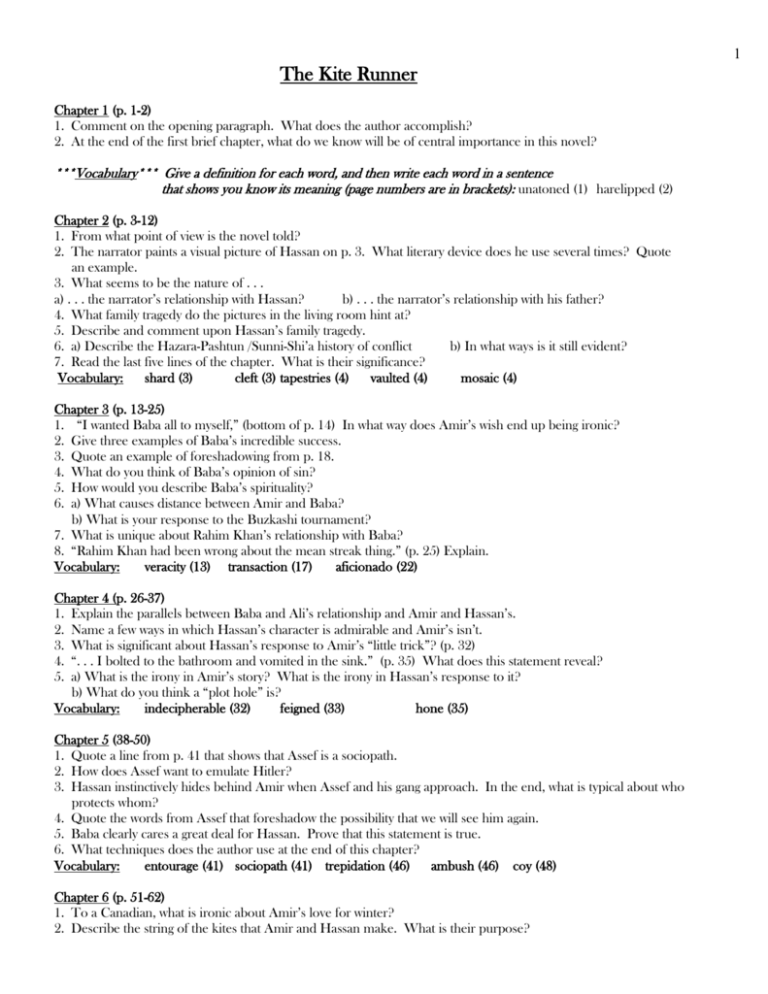
1 The Kite Runner Chapter 1 (p. 1-2) 1. Comment on the opening paragraph. What does the author accomplish? 2. At the end of the first brief chapter, what do we know will be of central importance in this novel? ***Vocabulary*** Give a definition for each word, and then write each word in a sentence that shows you know its meaning (page numbers are in brackets): unatoned (1) harelipped (2) Chapter 2 (p. 3-12) 1. From what point of view is the novel told? 2. The narrator paints a visual picture of Hassan on p. 3. What literary device does he use several times? Quote an example. 3. What seems to be the nature of . . . a) . . . the narrator’s relationship with Hassan? b) . . . the narrator’s relationship with his father? 4. What family tragedy do the pictures in the living room hint at? 5. Describe and comment upon Hassan’s family tragedy. 6. a) Describe the Hazara-Pashtun /Sunni-Shi’a history of conflict b) In what ways is it still evident? 7. Read the last five lines of the chapter. What is their significance? Vocabulary: shard (3) cleft (3) tapestries (4) vaulted (4) mosaic (4) Chapter 3 (p. 13-25) 1. “I wanted Baba all to myself,” (bottom of p. 14) In what way does Amir’s wish end up being ironic? 2. Give three examples of Baba’s incredible success. 3. Quote an example of foreshadowing from p. 18. 4. What do you think of Baba’s opinion of sin? 5. How would you describe Baba’s spirituality? 6. a) What causes distance between Amir and Baba? b) What is your response to the Buzkashi tournament? 7. What is unique about Rahim Khan’s relationship with Baba? 8. “Rahim Khan had been wrong about the mean streak thing.” (p. 25) Explain. Vocabulary: veracity (13) transaction (17) aficionado (22) Chapter 4 (p. 26-37) 1. Explain the parallels between Baba and Ali’s relationship and Amir and Hassan’s. 2. Name a few ways in which Hassan’s character is admirable and Amir’s isn’t. 3. What is significant about Hassan’s response to Amir’s “little trick”? (p. 32) 4. “. . . I bolted to the bathroom and vomited in the sink.” (p. 35) What does this statement reveal? 5. a) What is the irony in Amir’s story? What is the irony in Hassan’s response to it? b) What do you think a “plot hole” is? Vocabulary: indecipherable (32) feigned (33) hone (35) Chapter 5 (38-50) 1. Quote a line from p. 41 that shows that Assef is a sociopath. 2. How does Assef want to emulate Hitler? 3. Hassan instinctively hides behind Amir when Assef and his gang approach. In the end, what is typical about who protects whom? 4. Quote the words from Assef that foreshadow the possibility that we will see him again. 5. Baba clearly cares a great deal for Hassan. Prove that this statement is true. 6. What techniques does the author use at the end of this chapter? Vocabulary: entourage (41) sociopath (41) trepidation (46) ambush (46) coy (48) Chapter 6 (p. 51-62) 1. To a Canadian, what is ironic about Amir’s love for winter? 2. Describe the string of the kites that Amir and Hassan make. What is their purpose? 2 3. a) Explain the role of the kite runners. b) Who is the kite runner after whom the novel is named? Describe his abilities. 4. Explain the simile towards the bottom of p. 57. 5. a) What do you think the “second face” (top of p. 58) might be? b) Comment on Amir’s difficulty in maintaining eye contact. For what different reasons do people have this difficulty? c) What new quality do we see in Hassan? d) Comment on Amir’s observation on p. 58: “They think everyone else does too.” 6. Read the first sentence on p. 59. What does it signal? 7. Explain Amir’s question on p. 63: “Had he just slipped me a key?” Vocabulary: hovel (54) coveted (54) horde (55) dank (54) abhor (55) Chapter 7 (p. 63-84) 1. Interpret Hassan’s dream. 2. Is Hassan a blessing or a curse to Amir? Explain. 3. Look at the sentence in italics that begins on p. 67 and ends on p. 68. Whose voice do you imagine saying it? 4. Describe Amir’s theology as it is expressed at the bottom of p. 69. What is your opinion of it? 5. What words, actions, or thoughts do you think most powerfully convey Amir’s exuberance about winning? 6. What rare quality does Amir exhibit at the top of p. 71? Why does he demonstrate such a quality at this time? 7. Quote an example of foreshadowing from p. 71. 8. Does the picture on the cover accurately represent Amir as he “Peeked around the corner”? (bottom of p. 75) Explain. 9. Does bullying typically occur with a powerful lead bully and some weaker “wannabes”, as is the case with Assef, Kamal, and Wali? 10. Does Assef speak the truth on the bottom half of p. 77? 11. Quote another example of foreshadowing from p. 78. 12. What is the significance of: a) . . . the memory of the fortune-teller? b) . . . the dream? 13. a) What is “the look of the lamb”? (p. 81) b) What parallels are there between the slaughter of the lamb as Amir describes it and what Hassan edures? 14. Why do you think Amir chooses the option he does? What do you think of his choice? Vocabulary: intoxicating (69) taut (69) tousle (71) haggle (73) scuttle (73) Chapter 8 (84-106) 1. How do you respond to the way in which Amir speaks to Ali? 2. Give evidence that Amir doesn’t have peace in his new relationship with his father. 3. Give two ironies related to “Baba and Amir’s” trip to Jalalabad. 4. What strong evidence is there that Amir is guilt-ridden about Hassan? 5. What literary device helps to convey the sounds of cooking? Quote it. 6. It is a cliché that when your dreams come true, it’s a disappointment. Do you think that this cliché is generally true? Do you think it could have been otherwise for Amir? Explain. 7. Quote the sentence(s) from Hassan and Amir’s conversation on pages 93-94 that are the most heart-breaking. 8. a) Why does Amir want to get rid of Hassan? b) What does Baba’s response reveal about him? 9. a) Does Amir want to hurt Hassan or get Hassan to hurt him? Explain. b) What is revealed about Hassan’s character in the pomegranate scene? 10. What is your response to the lengths to which Baba goes to celebrate Amir’s thirteenth birthday? 11. Is Del-Muhammad’s relationship with Baba uncommon for Baba? What does it reveal about Baba’s character? 12. What is so frustrating about people like Assef and the way they can come across to others? 13. What chance does Rahim Khan give Amir? Vocabulary: chasm (93) curt (95) amble (96) slough (96) preoccupy (96) Chapter 9 (p. 107-115) 1. Explain Amir’s use of the term “blood money”. 2. In what way does Amir think Rahim Khan’s story about Homaira is applicable to his situation? 3. a) What do the facts that both Ali and Hassan have been crying and that they are holding hands signify? b) Why does Hassan reply “Yes”? c) What do you think happened in the servants’ hut in the half hour before Ali and Hassan arrive in Baba’s study? 4. In what way is Amir naïve in thinking he is “Glad this would all be over with soon”? (p. 111) 5. a) Are you surprised by Baba’s forgiveness? Explain. b) Are you surprised by the extent of Baba’s grief? Explain. 3 6. Why do you think Hassan leaves his toys in the hut? 7. How do you think things would turn out if Amir had chosen the Hindi movie option? Chapter 10 (p. 116-131) 1. Read the first two pages of the chapter, and state as many changes to Amir’s situation as you can. 2. What is clearly still the same? How do you know? 3. What is the significance of the sentence, “I vomited on a tangle of weeds, my retching and groaning drowned in the deafening roar of the MiG.” (p. 120) 4. a) Name at least three qualities that Baba demonstrates as he deals with the Russian soldier. Provide support for each. b) Why does Amir think, “I too wondered if I was really Baba’s son.” (p. 122) 5. To what drug do you think the older Russian soldier refers? 6. Comment on Baba’s treatment of Karim on pgs. 124-125. 7. a) Why has Kamal withered? b) What is your response? 8. Briefly list the most depressing aspects of the refugees’ experience in the basement and the truck. 9. a) What is the significance of Amir’s memory? b) Quote and explain the metaphor Amir uses to compare his past life with his present life. 10. It is said that people become numb to tragedy when there is too much of it. How does the author convey a sense of numbness or make the reader feel numb by the chapter’s end? Vocabulary: tarpaulin (116) lucrative (117) embankment (117) snuff (126) encapsulated (129) Chapter 11 (p. 132-150) 1. Baba is a man who thinks for himself and is not afraid of what others’ opinions of him. Give two examples that support this statement: one from p. 132 and one from p. 133. 2. a) Baba’s response to Mr. Nguyen’s request for ID is very much in character. Support this statement. b) Although Baba is still the same man, his status and image are very different from what they were when Amir was a young boy. Prove the truth of this statement with at least three examples. 3. a) Why does Amir feel guilty for wanting to enroll in creative writing classes in college? b) Explain why he decides to stand his ground. c) Considering Baba’s sacrifices and disapproval, do you think he has made the right decision? 4. Explain what it is about America that Amir loves. 5. What are some unique characteristics of the Afghan section of the San Jose flea market? 6. What do you think is Baba’s meaning when he says, “ . . . what happens. . ..sometimes even (in) a single day can change the course of a whole lifetime, Amir. (p. 150) Vocabulary: dissertation (132) unkempt (143) haggle (v) (145) blue-collar (133) navigate (145) Chapter 12 (p.l 151-174) 1. Explain the connection between “yelda” and Soraya Taheri for Amir. 2. Quote the words from p. 152 that show that Baba knows exactly what his son is going through. 3. Put Baba’s warning from p. 153 in your own words and in a more straightforward manner. 4. What is your response to what the Afghans consider to be gossip material? 5. Explain Jamila’s “eagerness” with Amir. 6. Amir is truly captivated by Soraya. Give at least three proofs to support this statement, including at least one quotation. 7. Unlike Amir, Soraya wants to become a teacher, but in what way are the two similar with regards to their career aspirations? 8. Prove that as Baba faces sickness, his personality is still as strong as ever. 9. What indication is there that Amir’s childhood ambition has been realized: he is loved by a father who is proud of him. 10. Soraya wants to make sure that Amir knows about her history. What does her disclosure reveal about her character? What does Amir’s response reveal about his character? Vocabulary: lethal (156) insinuation (157) reticence (166) fickle (157) amiable (158) Chapter 13 (p. 175-199) 1. What is your impression of the “lafz”? 2. What words would you use to describe the wedding ceremony? Support your description. 4 3. The author is very subtle in his allusion to the married couple consummating their marriage. Do you prefer this subtlety to the more graphic and detailed writings that are typical in the West? Do you think it would have been better if he made no allusion to it whatsoever? 4. “Baba hated it when I cried.” (p. 182) Why is Amir crying? Is it because of one thing only? Explain. 5. Amir’s character as a young man is clearly very different from his character as a boy. What has changed? What has brought about the change? 6. Does Baba have a good death? Explain. 7. Is the relationship between Amir and Soraya too good to be true, or is it possible? Support you answer. 8. How is the general different from Baba? 9. Why is Jamila so preoccupied with her “health”? 10. Why do so many cultures have double standards for men and women when it comes to sexual morality? 11. For whom is Amir and Soraya’s situation most heart-breaking? Why do you think so? 12. Quote the line that proves that Amir is a diplomat. Comment on his choice of words and what he accomplishes by saying them. Vocabulary: reverberate (v) (183) Chapter 14 (p. 200-204) 1. Why do you think the author includes the date at the beginning of the chapter? 2. Refer to the first page of the novel. How does the reader know that chapter 14 is important? 3. The general’s health is declining, but his wife and daughter are happier. Explain. 4. Describe the mood towards the chapter’s end. Chapter 15 (p. 205-213) 1. Quote an example of imagery from p. 206 as Amir rides through Peshawar in the taxi. 2. What are some of the differences between Pakistan and the U.S.? 3. Briefly describe Afghanistan under the Northern Alliance’s rule from 1992-1996. 4. How was the Taliban received by Afghans when it took over from the Northern Alliance? Why? Vocabulary: garrulous (206) collateral damage (211) wallow (212) pragmatic (212) presumptuous (218) Chapter 16 (p. 214-225) 1. For what reasons did Rahim Khan seek out Hassan? 2. What indications were there that Hassan had built up a good life? 3. How is Hassan’s attitude towards Amir different from Amir’s attitude towards Hassan? 4. Do you find Hassan’s level of “respect” (p. 219) admirable or disturbing? Explain. 5. What part(s) of Sanaubar’s story do you find the most touching? 6. Describe Sohrab as Rahim Khan remembers him. 7. What possible tragedy is foreshadowed at the end of the chapter? Chapter 17 (p. 226-235) 1. Briefly describe life under Taliban rule as Hassan writes of it. 2. Does Hassan seem to be similar to or different from the way he was as a boy? Explain. 3. How might things have turned out differently for Hassan if Amir had confronted his attackers twenty-six years earlier? 4. Do you think Rahim Khan feels guilty? Explain. 5. a) What is it Rahim Khan want Amir to do? b) What “weapons” does he use in trying to persuade Amir to do it? (There are three.) 6. Rahim Khan’s last piece of information enrages Amir. List as many of Amir’s possible realizations as you can think of as he absorbs this information. Chapter 18 (p. 236-239) 1. Do you think Amir “should have known”? 2. a) Explain Amir’s anger at his father. b) In what way does Amir realize that he and his father are alike? 3. What is your response to Baba’s “lie”? 4. Why do you think Amir decides to go to Kabul? 5 Chapter 19 (p. 240-254) 1. How is Farid like Baba as Amir has his familiar condition in the car? 2. Explain Farid’s statement, “You’ve always been a tourist here, you just didn’t know it.” (p. 245) 3. In what way is Wahid different from his brother Farid? 4. “He was looking down now, playing with the frayed edges of the straw mat.” (p. 250) What is the significance of this sentence? 5. What is the significance of Amir’s dream? 6. a) Explain Amir’s misunderstanding of the boys’ “interest in his watch”. b) Comment on the level of hospitality shown by Wahid. Is it admirable? Vocabulary: arduous (245) dilapidated (246) renowned (246)riveting (248) waft (v) (253) Chapter 20: (p. 255-270) 1. Quote the simile on p. 258 that Amir uses to describe Kabul. Briefly describe the city as it has now become. 2. Describe the Talibs. 3. In what ways does the old beggar man symbolize the tragedy of Afghanistan? 4. Amir realizes the beggar knew his mother. “’You knew my mother,’ I asked, kneeling before the old man.” With what do you associate the action of kneeling before someone? Do these associations apply in this case? 5. Explain why some of the children are in the orphanage even though they aren’t orphans. 6. Explain Zaman’s dilemma. What is your opinion of him? Vocabulary: stupefy (v) (256) morose (256) obliterate (258) oblige (260) Chapter 21 (p. 271-285) 1. What is the significance of Amir’s memory on p. 273? 2. “Just forget it all. Makes it easier . . . to go on.” (p. 275-276) Do you agree with Farid? How is his own advice working for him? 3. In what way can it be said that the evening in the hotel room is therapeutic for Farid? 4. Explain why Amir thinks that Afghanistan might be a hopeless place. 5. What is the irony in the “sexy pictures” incident? 6. “And they call themselves Muslims.” (p. 283) What does Farid mean? 7. Quote the simile at the top of p. 284. Comment on its use in this context. 8. How do you respond to the half-time entertainment? Why do you think the sin of adultery is the one the author chooses to use for this section? Vocabulary: Rorschach inkblot(274) crane (v-281) undulate (v-282) enunciate (v-283) Chapter 22 (p. 286-306) 1. Would Baba have done well in this situation? Explain. 2. Who do you imagine saying the words in italics on p. 288? 3. What evidence of affluence is there in the house of the Talib? 4. Why is the Talib shaking? What are the “tracks” (p. 289) on his arms? 5. What is revealed about the Talib’s character as he talks about the Hazara massacre in Mazar-i-Sharif? Quote the line(s) that most exemplify what you’ve said. 6. a) What metaphor does the Talib use to describe the U.S.? b) How does he overtly try to instill fear into Amir? 7. Quote the two words (p. 292) that suggest the Talib thinks he owns Sohrab. 8. Do you find most disturbing about the life Sohrab is forced to live under this roof? Quote the line(s) that bother you the most (even if the quotation is not completely related to what you write in the first part of the question). 9. What metaphor is used for Sohrab that is earlier used for his father? (p. 293) 10. a) Explain why Amir laughs. b) Explain why his laughter is particularly aggravating to Assef. 11. It is often said that revenge is sweet. Would you call what happens to Assef revenge or justice or something else? (Is it sweet?) Explain. Vocabulary: prudence (288) morbid (289) vitreous fluid (305) Chapter 23 (p. 307-325) 1. Describe the narrative style used in the first part of this chapter. What does it convey about Amir’s mental state? 2. What does Amir’s vision of Baba and the bear signify? 3. “. . . though there will be a scar.” (p. 311) Why is this fact significant? 6 4. Sohrab is clearly not going to bounce back to happiness after his month with Assef. Give an indication of this fact from the chapter. 5. a) Do you think Rahim Khan should have communicated what was in his letter to Amir before Amir went to Kabul? Why or why not? b) Rahim Khan has known all along about Hassan. Should he have been more straightforward with Amir when he was a boy? Why or why not? c) Explain Baba’s personality and attitude towards Amir, when he was a boy, in light of what has been revealed. 6. Why does Sohrab react as he does when Amir asks him if he wants to be friends? 7. Why does Amir insist upon leaving when he is nowhere close to being better? 8. Why did Rahim Khan tell Amir about the Caldwells? Chapter 24 (p. 326-361) 1. Why is Fayyaz is being so difficult, and mentioning things like bicycles that have nothing to do with the situation? 2. Why does Sohrab actually open up and talk to Amir when Amir finds him? 3. a) Are you surprised by what is troubling Sohrab? Why or why not? b) Do you agree with the lesson Amir is teaching him? 4. Quote the line(s) you find the saddest as Sohrab sobs. 5. What is your response to the conversation Amir has with Sohrab on p. 388? 6. Quote the example of repetition at the bottom of p. 340. Why is it used? 7. How would you describe the role Soraya plays for her husband on p. 342? 8. If you know the novel/movie/rock opera “Les Miserables”, explain Amir’s reference to Jean Val Jean and Javert on p. 345. (If not, you can skip the question or make a quick search on the internet to find out.) 9. a) Briefly describe the character of Andrews as Amir talks with him. Support your description with proof, including quotations if you wish. b) How do you reassess your opinion after what the secretary says on p. 349? 10. For what reason(s) does Sohrab take a long bath every night? 11. Do your best to explain/describe the frustration Amir meets with as he discusses the possibility of adoption with Omar Faisal. 12. Sohrab is incapable of accepting that an orphanage can be a good place. Explain the situation from his point of view. Vocabulary: girders (326) miranets (326) grimace (328) oblivious (329) nimbus (356) Chapter 25 (p. 362-391) 1. Why is the first part of the chapter written in the present tense? 2. Of wat does Amir’s prayer remind you from earlier in the novel? Is his faith more authentic now? Explain. 3. Consider what Dr. Nawaz and Raymond Andrews are each associated with in Amir’s mind, and state why Amir dreams that Dr. Nawaz is Raymond Andrews. 4. “Had I actually gone to sleep after I had given Sohrab the news he feared the most?” (p. 369) 5. Before his time in hospital, Sohrab had been somewhat axcited about the idea of going back to the U.S. with Amir. Why isn’t he now that all the obstacles have been removed? 6. Quote the simile used at the bottom of p. 374. 7. “That last thought had brought no sting with it.” (p. 378) What does this quotation signify? 8. What is your response to Amir’s answer to his father-in-law’s question on p. 380? 9. In what ways has Amir become the best of his father and the best of Hassan? 10. “ . . . the silence that sucked everything in like a black hole.” (p. 382) Comment on this line. Is it true that one silent person can silence a whole household? 11. Explain the importance of one’s fellow countrymen when living in a new and foreign country. 12. For what reason(s) do you think Soraya gives up on attempts at engaging Hassan and Amir doesn’t? 13. What do you think the author wants to accomplish with his choice of ending? Explain. Vocabulary: gurney (362) serpentine (368) relinquish (375) catharsis (376) impassive (377)
